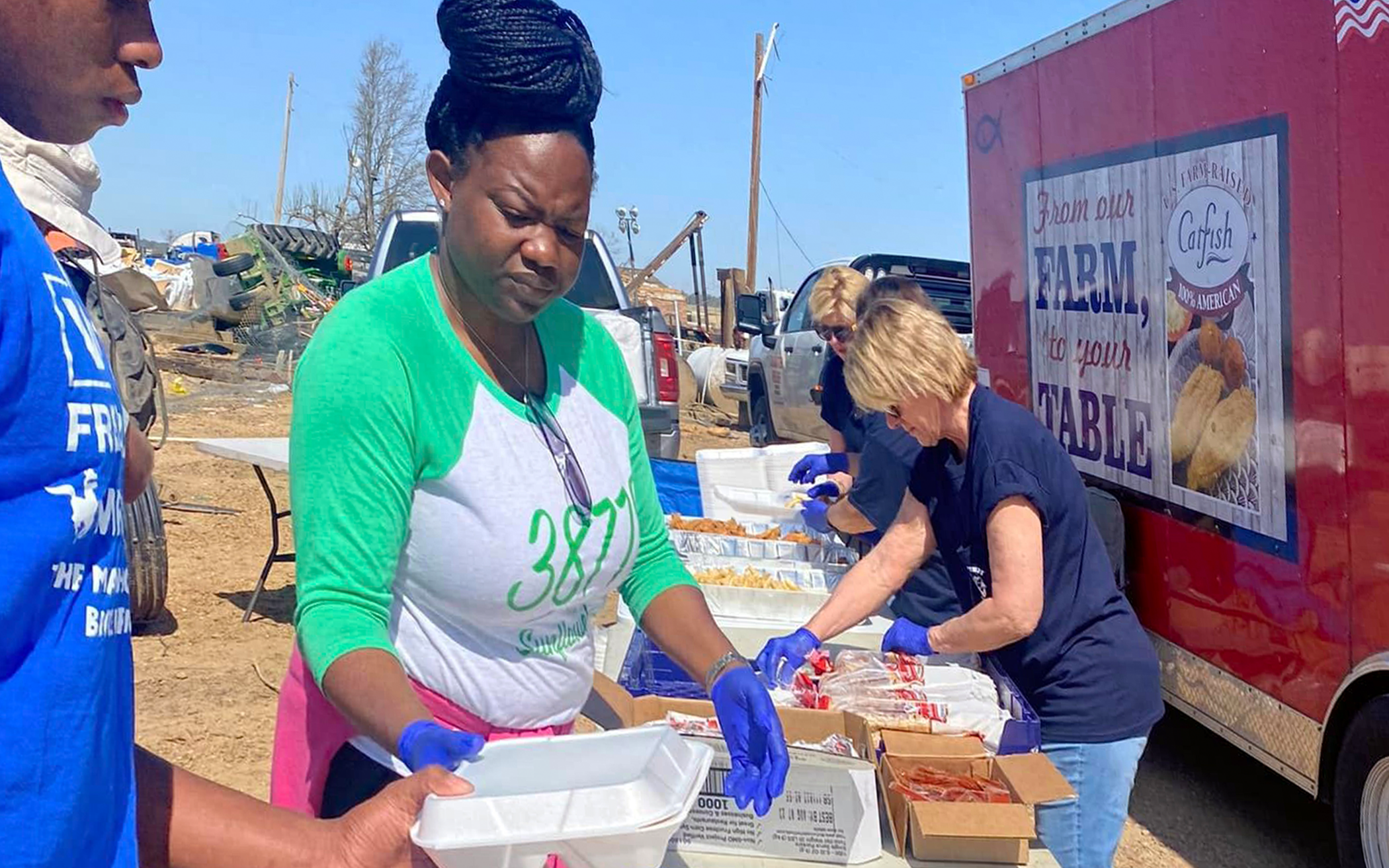The Banner has a subscription to republish articles from Religion News Service. This story by Bob Smietana was published on religionnews.com March 27, 2023. Paragraphs 16-18, with context for the Christian Reformed Church, have been added.
When volunteers show up after a disaster like last weekend’s deadly tornadoes in Mississippi, some bring chainsaws, tarps, and heavy equipment.
Donnie Wedgworth and his friends bring catfish.
On Monday (March 27), Wedgworth and a group of church friends—who call themselves the Catfish Navy—were frying up catfish, French fries and hush-puppies (cornmeal dumplings), planning to serve about 600 meals to local residents and first responders in Silver City, Miss., one of the small, rural towns affected by Friday’s tornado, which killed 26 people.
The volunteer group, which hails from Greensboro, Ala., a town of fewer than 3,000 people, served another 500 meals on Sunday before a thunderstorm forced them to shut down.
Wedgworth, an elder at a Presbyterian church, said most of the folks in the group knew each other from working in the catfish industry. There are also Baptists and Methodists in the group of senior citizens.
“The youngest person with us is 60,” he said.
Faith-based volunteers like Wedgworth are often among the first on the ground to help clean up after major disasters. Many are senior citizens who have devoted time and energy to getting prepared to lend a hand. For Wedgworth and his friends, that meant getting a 24-foot trailer a few years ago to carry their cooking equipment.
They set up in Silver City after talking with other faith-based disaster-relief groups. Wedgworth said that other groups are often set up to help larger communities and stay long-term. The group he’s part of works best in small towns and shows up as soon as they can.
For Wedgworth, responding to a disaster feels like the right thing to do.
“I do like helping people, and we do like serving God,” he said.
Baptists from Mississippi and Arkansas have set up disaster-response sites in Rolling Fork, where much of the town was destroyed by the tornado, and in the town of Armory. Hubert Yates, director of Mississippi Baptist Disaster Relief, said the group likely will continue to work in both areas for at least six weeks. Volunteer teams will bring chainsaws and heavy equipment to clear trees, he said, and they’ll also be helping residents get tarps on their roofs.
“We’ll also see what needs develop,” said Yates, who said that Baptists might also set up mobile kitchens and other forms of assistance in the weeks to come.
Other faith-based groups, like Mennonite Disaster Services and World Renew’s Disaster Response Services, are currently talking with their volunteers and assessing when to get involved with the response in Mississippi.
Darin Bontrager, a regional operations coordinator of Mennonite Disaster Services, said that the group already has 10 long-term projects going in other parts of the Eastern United States. Some of those projects, like rebuilding in Mayfield, Ky., and Lake Charles, La., are about to go on hold due to a lack of volunteers during the summer months.
He said Mennonites might wait until the initial clean-up and response—that disaster-aid groups like the Southern Baptists excel at—is over before beginning any work in Mississippi. Mennonites tend to focus on long-term rebuilding but do have some volunteers who are trained in cleanup efforts.
Chris Gibson, Disaster Response Services groups program manager with World Renew, said a key component is to coordinate response with local authorities. “As of yesterday (March 27), emergency managers in the affected communities still had these locations sealed off from outside assistance,” Gibson said. “The only people supposed to be in these towns right now are the ones who actually live there, or authorities invited in for search and recovery operations. … Once emergency management authorities lift these restrictions, our partners in the area will do damage assessments and deploy volunteers in accordance with the wishes of local authorities.”
Gibson said staff and key volunteer leaders with DRS have a long history of disaster recovery work in the state of Mississippi. In fact, “the latest DRS volunteer team served on a tornado reconstruction site in Hattiesburg just two weeks ago, six years after a tornado hit that community,” Gibson said.
“Our relationship with disaster recovery partners is strong in Mississippi, and we have already reminded our partners that we are available to assist as needed—both with short term cleanup, as well as the more likely long term disaster recovery work we may do over the next 1-3 years.”
Bontrager, with Mennonite Disaster Services, said disaster relief is one place where different faith groups as well as secular groups work as partners—coordinating their efforts and playing to their strengths.
“There’s nothing like a disaster to bring people together,” he said.
c. 2023 Religion News Service
About the Author
Religion News Service is an independent, nonprofit and award-winning source of global news on religion, spirituality, culture and ethics.

